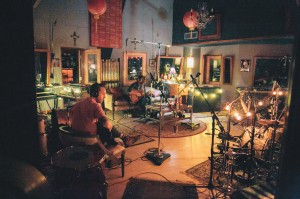
Around 2009 and ’10, the band was blowing up. It had two Top 40 singles, songs on MTV and more than 20 television shows, and the guys’ faces were all over the web and in various magazines. GRO were on just about every hot list of up-and-coming bands.
The group’s success, however, came at a time when Capitol Records was sinking. Desperate to capitalize on the buzzy five-piece, label execs wanted another record, fast.
“They told me they were going to fly me to L.A. to co-write an album in 30 days,” Jenkins said.
The label also wanted GRO to record the follow-up to their major label debut in just three weeks. The band felt uneasy about relinquishing creative control and the speed at which Capitol wanted the albums turned out.
“We had just spent two years in a van, and we were emotionally, physically, and spiritually tapped out,” Jenkins said.
To keep GRO on the label, Capitol had to pick up an option in the band’s contract. Thanks in part to the label’s financial turmoil –– it had just fired its entire legal department –– lawyers for the company missed the deadline to renew the contract by two weeks. The band walked away from the deal.
“We didn’t know what we were going to do,” Jamey said. “We didn’t even know if we were going to be a band anymore. That could have been the worst decision we ever made. It was a huge leap of faith.”
In the world of major labels, bands have to borrow money for recording, promotion, accommodations, and other expenses.
“Every year, I still get a bill from Capitol for $400,000,” Jamey said. “It looks like a phone book.”
The record company still owns the rights to Out of My Hands, althoughCapitol allows GRO the rights to play and re-record the songs from the release.
“We took that album and put it online for free,” Jamey said. “We gave away 40,000 copies in exchange for e-mail addresses.”
One of the songs Capitol execs wouldn’t allow on Out of My Hands was “Dancing Shoes.” The label thought the tune was too country influenced and wanted the guys to continue cranking out pop-rock hits. The group put the song on its following recording, 2012’s independently released Under Fire.
“When we got out of our deal, we released an EP of music the label had said no to,” Jamey said. “One of those songs was ‘Dancing Shoes.’ Country stations started playing it, and we sold about 150,000 singles.”
As songwriters, the band felt liberated. A trip to a cabin in Tennessee inspired GRO to write a mellow, twangy, acoustic album, Chasing Down the Wind, released in 2013.
“It’s really easy to try to write a country song and come across as really inauthentic, which was why Chasing Down the Wind was so cool,” Geoff said. “We didn’t sit down and say, ‘let’s write a bunch of country songs’ or ‘let’s write a bunch of acoustic songs.’ We just sat down next to a river and wrote a bunch of songs.
“When we recorded those songs, it was real,” he continued.
******
Sitting at Brewed, the chic Near Southside restaurant/craft beer bar/coffee bar, the members of GRO seem to know everyone in the place. Sure, Jamey is one of the eatery’s owners. But, if you didn’t know better, you’d think the guys were running for office for all of the handshakes and well-wishers who came to their table.
Endearing themselves to people is part of GRO’s story. It’s a huge part of the reason the band members have been able to connect with fans and keep people coming to see their shows and buying albums.
“We’re not one of those bands that stays in the green room after a show,” Jamey said. “We’re out at the merch table talking to people, shaking hands, getting their phone numbers.”
Learning the business side of being in a band didn’t come easy for GRO. A few years back, the group realized that some money was missing. Because of the misdeeds of a shady accountant, the guys were forced to let go of their entire management team –– some of whom were close, longstanding friends.
“We learned some hard lessons,” Jamey said. “A few years back, we were just very unaware of the money that was coming in and out of the band … and there was no accountability with our team.
“There were a lot of arguments about copyrights –– who owned what song,” Jamey continued. “That’s when we stopped being musicians only. We had a pretty big business, and we were not being good stewards of that business. We fired everyone and ran it ourselves.”
When GRO released Chasing Down the Wind in 2013, it did so without a booking agent, manager, or an accountant.
“We were more profitable as a business that year than we ever had been,” Jamie said. “That taught us a lot.”
Jenkins said that learning to read contacts, a duty Jamey took over, was one of the many eye-opening changes the guys had to make.
“If I were to give advice to young bands it would be to perfect your craft but learn business,” he said. “Do math. How much are you going to spend on a tour? How much are you going to make?
“It’s never been easy for us,” he continued. “You can’t just turn a blind eye to things.”
******

Jamey and Geoff started down the rock ’n’ roll path as pre-teens playing “Sweet Home Alabama” in the McLean Middle School talent show. The following year, Jamey’s freshman year at Pascal, the duo began writing original material and playing with a drummer who knew Jenkins, who went to Aledo High School with Wilkerson. Hunker joined the band a few years later, after the first drummer chose to forgo his rock dreams to go to college.
These days, the band doesn’t tour at the same rigorous pace it once did, though that’s not to say the members still don’t work their asses off. On the day I went to the band’s rehearsal, the guys had been up since 6:30 a.m. to perform on Good Day on Fox 4. The night before, Jenkins and Hunker both drove down from their homes in Tennessee with the group’s lights. After I left, the guys had eight more interviews that afternoon. The following evening, the band performed an online pop-up show recorded at Christ Chapel Bible Church. The day after that, the guys flew to Utah to perform at Sundance.
Though band life still has its rigors, the guys are on the road only 50 to 60 days a year, as opposed to around 300 earlier in their careers.
“We’re at a place now in our career where we can play just weekends and just fly out,” Jenkins said. “We’ll do one or two tours a year. It’s just easier.”
Performing live still has its share of unexpected pitfalls. At a recent performance in Los Angeles, in front of a room full of industry types, the band played its first song in complete darkness. The lights the guys bring to every show came unplugged, and before the show the guys told the soundman to kill all of the stage lights for their first number.
“Well, we wanted it to be dramatic,” Hunker said with a laugh.
Jamey and Jenkins are both married now, and both of them recently had a child. Jenkins has an eight-month-old and Jamey’s is only three weeks old.
Being mindful of family time and each member’s personal needs has been one of the keys to the band’s longevity, Jenkins said.
“There are always things we need, like time at home with the wife,” he said. “You have to take that into account. If your professional life is booming but you could be burning out personally, the whole thing falls apart.
“We’re just in a different season of life,” he said. “We have a lot more stability.”











Great article about my favorite band! Loved hearing their whole story!